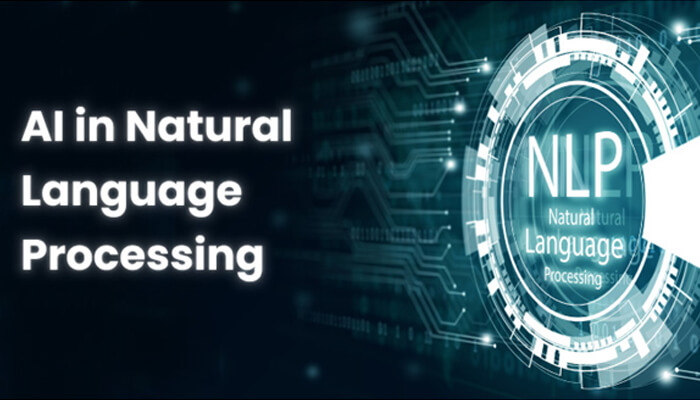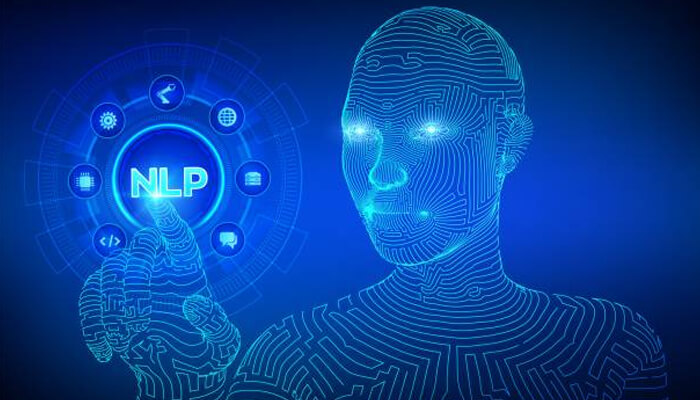Artificial Intelligence (AI) has revolutionized the field of Natural Language Processing (NLP) by enabling computers to understand, analyze, and generate human language. NLP involves the use of computational techniques to process and manipulate natural language data, such as text and speech. AI in Natural Language Processing algorithms, including Machine Learning (ML) and Deep Learning (DL), provides the foundation for NLP by enabling computers to learn from large amounts of language data and identify patterns and relationships in language that are difficult for humans to detect.
It is clear that the role of AI in NLP is vital and is expected to continue driving progress in this field. As an artificial intelligence development company, we are at the forefront of this technology and are excited about the possibilities it offers for the future of human-computer interaction.
Let’s understand in-depth AI in NLP.
How AI is Used in NLP?
AI enables NLP to perform complex tasks such as language translation, sentiment analysis, and text summarization. AI-powered NLP applications process large amounts of text data using various machine-learning techniques to identify patterns and relationships within the data. AI-powered NLP algorithms then use this information to perform tasks such as language translation, sentiment analysis, and text summarization.
Examples of AI-powered NLP Applications
There are numerous AI-powered NLP applications used in various industries, including healthcare, finance, e-commerce, and customer service. One example of an AI-powered NLP application is a chatbot. Chatbots use natural language processing and AI to interact with customers in a conversational manner. They can answer questions, provide recommendations, and even complete transactions, thus providing customer support 24/7 without the need for human intervention.
Another example of an AI-powered NLP application is sentiment analysis. Sentiment analysis uses machine learning algorithms to analyze text and determine the sentiment expressed within it. This can be used to monitor social media sentiment towards a brand, product, or service, and can help companies identify areas for improvement. In healthcare, AI-powered NLP applications are used to improve patient outcomes by analyzing electronic medical records and medical imaging to identify patterns that can improve diagnosis and treatment.
Benefits of Using AI in NLP
1. Efficiency: AI-powered NLP applications can process and analyze large amounts of text data quickly and accurately. This makes it easier for businesses to analyze customer feedback, market trends, and social media sentiment in real-time, without the need for human intervention.
2. Automation: AI-powered NLP applications can automate tasks that would otherwise require human intervention. Chatbots, for example, can handle customer queries and complaints 24/7, freeing up customer service representatives to focus on more complex tasks.
3. Accuracy: AI-powered NLP applications can analyze text data with a high degree of accuracy, reducing the risk of errors and improving the quality of insights generated. This is particularly important for tasks such as language translation, where even minor errors can have a significant impact on communication.
4. Scalability: AI-powered NLP applications can scale to handle large amounts of text data, making them ideal for analyzing data from social media, customer feedback, and other sources. This allows businesses to gain insights into customer behavior and preferences on a large scale, enabling them to make data-driven decisions.
5. Improved Customer Service: AI-powered NLP applications, such as chatbots, can provide customers with 24/7 support, improving response times and reducing the need for customers to wait for a human representative. This can lead to higher levels of customer satisfaction and loyalty.
6. Identifying Issues Early: AI-powered NLP applications can identify potential issues before they become major problems. Sentiment analysis, for example, can alert businesses to negative sentiment towards a product or service, allowing them to address the issue before it escalates.
7. Improved Patient Outcomes: In healthcare, AI-powered NLP applications can analyze electronic medical records and medical imaging to identify patterns that can improve diagnosis and treatment. This can lead to better patient outcomes, reduced costs, and improved efficiency in healthcare delivery.
Overall, AI-powered NLP applications offer several benefits over traditional methods, including efficiency, automation, accuracy, scalability, improved customer service, and improved patient outcomes. As AI and NLP continue to evolve, we can expect to see even more innovative applications in the years to come.
Challenges and Limitations of Using AI in NLP
1. Data Quality: AI-powered NLP applications rely on large amounts of data to learn and improve. However, the quality of the data used can significantly impact the accuracy and effectiveness of the application. Low-quality data can lead to biased results, inaccurate insights, and poor performance.
2. Lack of Contextual Understanding: While AI-powered NLP applications can analyze text data at scale, they may lack the contextual understanding that humans possess. This can lead to misinterpretation of text data and inaccurate insights.
3. Language Variations and Idioms: AI-powered NLP applications may struggle with language variations and idioms, particularly in languages with complex grammar rules or regional variations. This can lead to inaccuracies in translation and analysis.
4. Model Bias and Fairness: AI-powered NLP applications are only as unbiased and fair as the models they are built on. If the model contains biases or lacks diversity in the training data, the results of the application may reflect these biases. This can lead to unfair or inaccurate results, particularly in areas such as hiring or legal decision-making.
5. Privacy and Security Concerns: AI-powered NLP applications often require access to large amounts of personal data, raising privacy and security concerns. If this data falls into the wrong hands, it can be used for nefarious purposes such as identity theft or fraud.
6. Integration with Legacy Systems: Integrating AI-powered NLP applications with existing legacy systems can be challenging, particularly if these systems were not designed with AI in mind. This can lead to technical difficulties and delays in implementation.
Overall, while AI-powered NLP applications offer many benefits, there are several challenges and limitations that must be considered. Addressing these challenges will be crucial for businesses and organizations looking to leverage AI in their NLP applications.
Conclusion
In conclusion, AI plays a critical role in NLP by enabling computers to analyze, understand, and generate natural language text. AI-powered NLP applications are used in a variety of industries to automate tasks, improve customer service, and improve patient outcomes. With the continued development of AI and NLP, the possibilities for these technologies are limitless, and we can expect to see even more innovative applications in the years to come.



